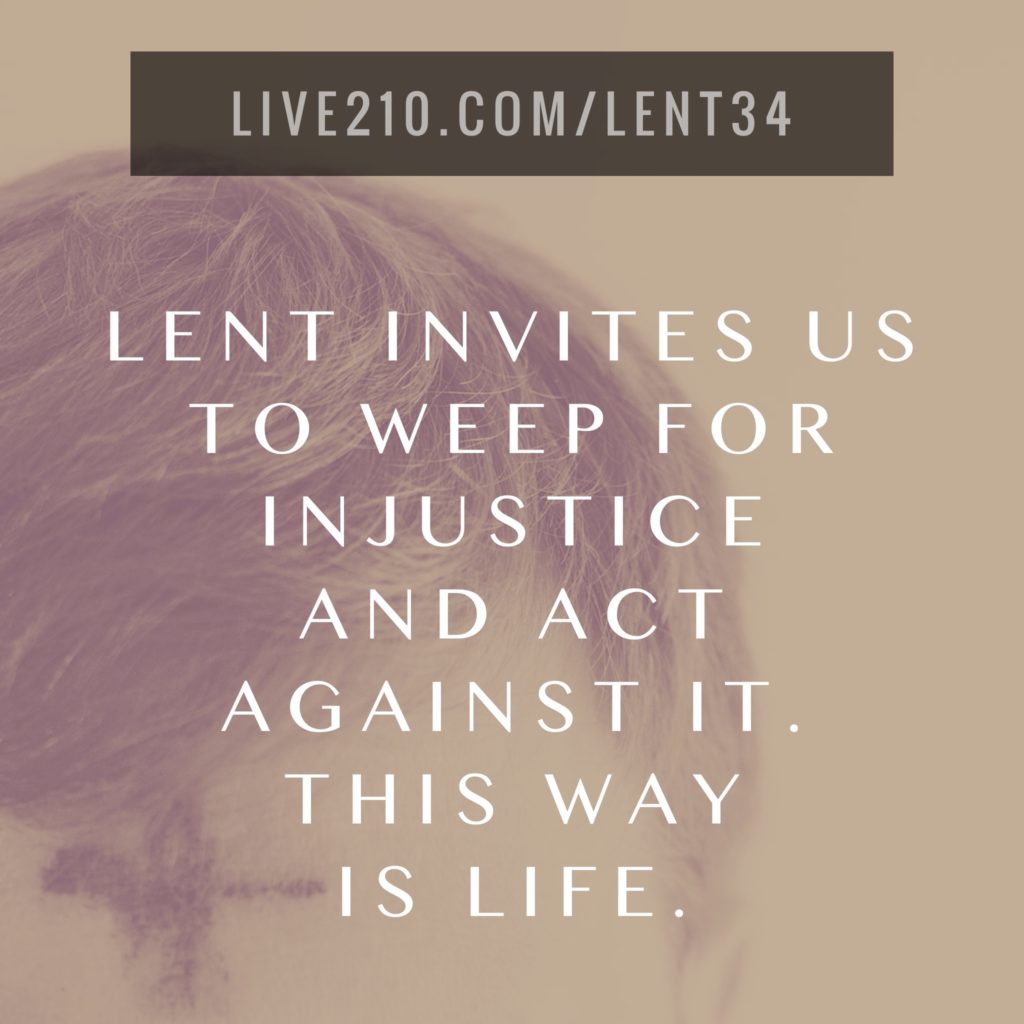5 min. to read.
This is the 34th day of Lent. The scripture today is Luke 23:27-31, when the women of Jerusalem weep for Jesus.
Along the way to the place of execution, crowds began to gather, watching Jesus carry his cross. Among those crowds were women who knew Jesus or who had watched Jesus from afar. Seeing him walk toward his death was too much. They wept. Jesus noticed and gave them a grave warning.
“Don’t weep for me,” he said. “Weep for yourselves and your children.” Then he prophesied that a time was coming soon when catastrophe would strike. People would wish they were dead. Then he asked, “If they do this when the wood is green, what will happen when it is dry?” The “they” in that question generally referred to the powerful, and specifically referred to the Romans.
An increasing number of commentators think Jesus was prophesying the Roman siege and destruction of Jerusalem that would take place about forty years later. For decades anti-Roman sentiment would foment, driven by nationalist factions willing to use violence against the occupiers. Eventually, Rome would decide the price of maintaining Judea as a province was too high. Instead of withdrawing their forces and demonstrating weakness to the rest of the Empire, they would drop the hammer. The Roman 10th Legion would lay the city bare, destroy the temple, crucify people until no more trees could be found, and bring an end to the ancient nation of Israel.
Modern Christians often think Jesus was offering the people of Jerusalem a choice between eternal salvation and damnation. Regardless of one’s view on the matter of eternity, Jesus was also giving them a choice between very real and immediate salvation or damnation. To choose the way of peace would have saved the people of Jerusalem from the fiery and horrifying damnation executed by the Empire.

The women of Jerusalem were weeping as they saw injustice and trauma inflicted on Jesus. When we see injustice right in front of us, it moves us. When the victim is someone we know or care about, our natural compassion rises and moves us to respond. We feel the weight of it. Maybe we weep. Maybe we begin to speak up. This is natural, but it’s not enough.
The women of Jerusalem weeping for Jesus wasn’t enough to stop the injustice because injustice is rarely about just one person. It’s nearly always the result of a system of power. In Jesus’ case, two systems worked hand in hand: the Empire, a system of power enforced by state-sanctioned violence, and the religious leadership, a system of power enforced by moral gatekeeping and corrupt politics. Both of these systems regarded Jesus as a threat, and he was. But systems of power have a significant blind spot. They always project. They believe their enemies use the same tactics they use. The violent always see the threat of violence around them. The politically corrupt always believe that their opponents are as corrupt as they are. Having been in control for so long, the powerful think they’ve set the rules of the game. Everyone must be playing by the same rules!
This is where they were wrong. Jesus wasn’t a threat because of violence or political corruption. Jesus was a threat because the new kingdom he brought ran by different rules entirely. Love does no violence and cannot be threatened by violence. Truth doesn’t play the games of corrupt politicians. As more and more people choose to follow Jesus’ way of love and truth,1Which is not the same thing as converting to Christianity, joining a church, or filling your time with nice, clean, church activities. empires of violence and corruption lose their power. Not only that, but Jesus’ way can even set those in power free. Love and truth stand with the oppressed, but they also free the violent and corrupt from the chains of their own system.
This is why it’s not enough to weep when we see injustice near us. Injustice impacts us all. Oppressive systems hurt people on both sides of the equation. For example, White Supremacist ideologies result in violence and discrimination toward people of color, but they also damage the hearts and minds of those caught up in the belief system of White supremacy. Jesus’ way of love and truth brings healing to both.
Jesus warned the women of Jerusalem that the cross was coming for them and their children. Choosing the way of love and peace not only helps the person in front of us who is being hurt by injustice, but it will also help others. It will also help us. Jesus’ way can save us all.
Lent invites us to weep for injustice and act against it. This way is life.
- 1Which is not the same thing as converting to Christianity, joining a church, or filling your time with nice, clean, church activities.
